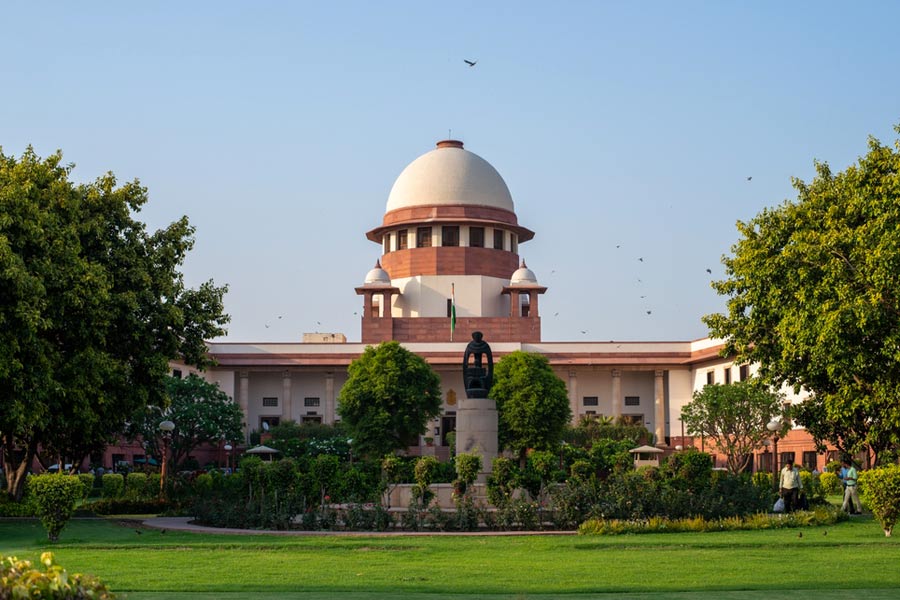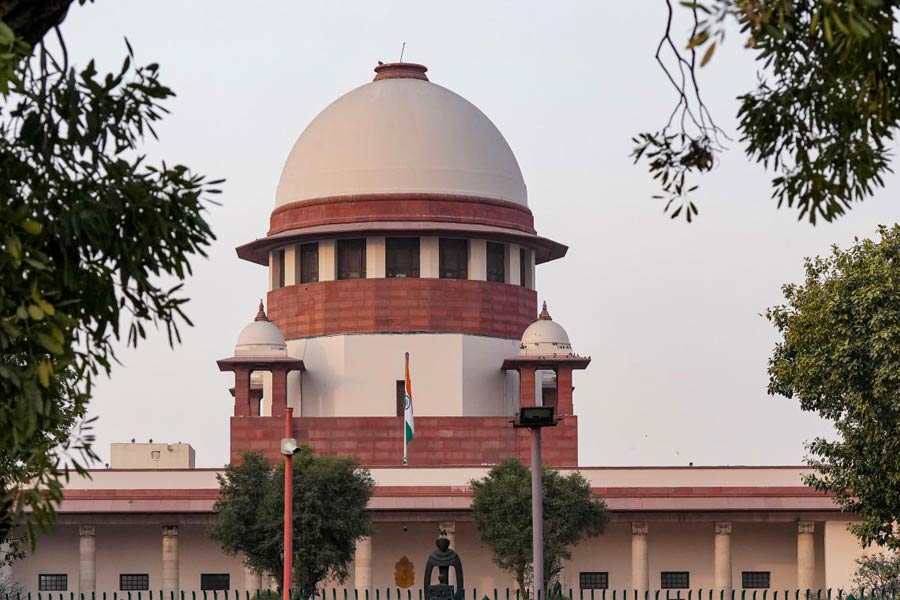The electoral bonds scheme for funding political parties should not become a tool for "legitimisation of quid pro quo" between power centres and people who are benefactors of that power, the Supreme Court said on Thursday as it underscored the need for reducing the cash component in the electoral process.
A five-judge constitution bench headed by Chief Justice D Y Chandrachud said the legislature and the executive can devise a system which does not have the "flaws" of this scheme and is more transparent.
"You can still devise a system which balances out in a proportional way, that is the point," the bench told Solicitor General Tushar Mehta, who was representing the Centre, during the arguments on a batch of pleas challenging the validity of the electoral bonds scheme.
The bench, also comprising Justices Sanjiv Khanna, B R Gavai, J B Pardiwala and Manoj Misra, said the moment an electoral bond was tendered to a political party, the party knows who has given it.
"Yes, that party will know. What the donor does not want is that the other party should not know this," Mehta said, adding, "We have to formulate a policy based on practicality".
He said every party knows who their respective donors were and confidentiality was required with regard to the other party.
"If this is so, why not make everything open?" asked the bench, which reserved its verdict after hearing arguments for three days. "As it is, everybody knows about it, the party knows about it. The only person who is being deprived is the voter. Your contention that the voters do not have right to know … is slightly difficult," the court observed.
During the hearing, the CJI flagged certain points for consideration.
"One, the need to reduce the cash element in the electoral process. Second, the need to encourage the use of authorised banking channel for that purpose, that is the only way you can reduce cash. Third is incentivising the use of the banking channel," he said.
"There is a fourth consideration which is the need for transparency and the fifth consideration which is that this should not become a legitimisation of the quid pro quo between the power centres, whether in the states or in the Centre, and people who are really in that sense benefactors of that power," Justice Chandrachud said, adding, "You can design another system which does not have the flaws of this system".
He said earlier there was a cap on donations being made by companies but now a firm having zero turnover can also donate.
Mehta said the existing scheme gives the option to donors to pay transparently.
"Your lordships have a very heavy responsibility on your shoulders, that is, encouraging clean money to come into the system and discouraging those elements which compelled the people to use the black money," he said, adding the purity of election was supreme.
He said the cap on donation by companies was removed with a view to discouraging creation of shell companies.
When Mehta referred to the positive approach of the government in dealing with the issue, the bench observed, "We don't have to go into the motive of the government at all. As a constitutional court, it is not part of our functions to deal with motives." "We don't want to go back now to a cash only system. That is not the purpose. All that we are saying is do it in a proportional, tailor-made manner which takes care of the serious deficiencies of this (scheme)," the bench said.
On the issue of alleged kickbacks or quid pro quo, Mehta said, "I would earnestly urge that while dealing with a subject which is bothering everyone, to start with a presumption that every contribution should necessarily be a part of corruption may perhaps be a wrong way of looking at it." The bench said everybody does not donate as kickback and there are corporate entities which have contributed to the productive assets of the nation.
The solicitor general said there was a mechanism for maintaining complete secrecy about the buyers of electoral bonds and this information cannot be shared with anyone.
Attorney General R Venkataramani also advanced his arguments in the matter.
He said the scheme seeks to protect confidentiality of the contributors, which is an enabling part of the scheme itself, and it does not make a difference between a corporate contributor or any other contributor.
"We have a framework today. We are testing the validity of that framework," the bench said.
Advocate Prashant Bhushan, appearing for one of the petitioners- NGO Association for Democratic Reforms (ADR)- said in his rejoinder submissions that there was evidence which suggested that almost all electoral bonds have gone to the ruling parties, either at the Centre or in states.
He said in view of the ensuing assembly elections in some states, the window for electoral bonds might be opened anytime.
"I request your lordships that even if you don't stay the electoral bonds now, it should be made clear to the parties that this may be subject to disclosure," Bhushan urged the court.
He said if the apex court agrees that electoral bonds were unconstitutional, then it must be disclosed which company has given these bonds to which party.
Bhushan said he has a problem with the anonymity aspect of the scheme.
Senior advocate Kapil Sibal, who was representing one of the petitioners, said the scheme was giving protection to corrupt transactions by not allowing the information to be made available in public domain.
Advocate Shadan Farasat, appearing for another petitioner, said public disclosure is the real check and full transparency was the best protection against any victimisation.
The scheme, which was notified by the government on January 2, 2018, was pitched as an alternative to cash donations made to political parties as part of efforts to bring in transparency in political funding.
According to the provisions of the scheme, electoral bonds may be purchased by any citizen of India or entity incorporated or established in India. An individual can buy electoral bonds, either singly or jointly with other individuals.
Only the political parties registered under Section 29A of the Representation of the People Act, 1951 and which secured not less than 1 per cent of the votes polled in the last election to the Lok Sabha or a state legislative Assembly are eligible to receive electoral bonds.
According to the notification, electoral bonds shall be encashed by an eligible political party only through an account with an authorised bank.
The apex court had, in April 2019, declined to stay the electoral bonds scheme and made it clear that it will accord an in-depth hearing on the pleas as the Centre and the Election Commission had raised "weighty issues" that had "tremendous bearing on the sanctity of the electoral process in the country".
Except for the headline, this story has not been edited by The Telegraph Online staff and has been published from a syndicated feed.












